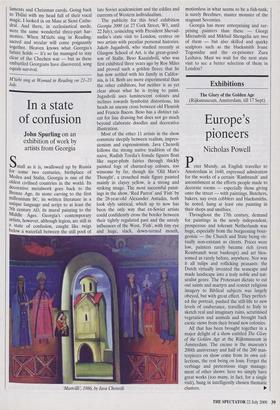In a state of confusion
John Spurling on an exhibition of work by artists from Georgia
Small as it is, swallowed up by Russia for some two centuries, birthplace of Medea and Stalin, Georgia is one of the oldest civilised countries in the world. Its decorative metalwork goes back to the Bronze Age, its stone carving to the first millennium BC, its written literature in a unique language and script to at least the 5th century AD, its mural painting to the Middle Ages. Georgia's contemporary artists, however, although legion, are still in a state of confusion, caught like twigs below a waterfall between the still pool of late Soviet academicism and the eddies and currents of Western individualism.
The publicity for this brief exhibition Georgia 2000 (at 27 Cork Street, Wl, until 22 July), coinciding with President Shevad- nadze's state visit to London, centres on two artists with peculiar personal histories. Jakob Jugashvili, who studied recently at Glasgow School of Art, is the great-grand- son of Stalin. Beso Kazaishvili, who was first exhibited three years ago by Roy Miles and proved such a golden fleece that he has now settled with his family in Califor- nia, is 14. Both are more experimental than the other exhibitors, but neither is as yet clear about what he is trying to paint. Jugashvili uses luminescent colours and inclines towards Symbolist distortions, his heads an uneasy cross between old Flemish and Francis Bacon. Beso has a distinct tal- ent for line drawing but does not go much beyond elaborate doodles and decorative illustration.
Most of the other 11 artists in the show commute sleepily between realism, impres- sionism and expressionism. Java Cheisvili follows the strong native tradition of the naive, Radish Tordia's female figures float like sugar-pluM fairies through thickly painted fogs of churned-up colours, too winsome by far, though his 'Old Man's Thought', a crouched male figure painted mainly in clayey yellow, is a strong and striking image. The most successful paint- ings in the show, 'Red Parrot' and 'Fish' by the 28-year-old Alexander Antadze, both look slyly satirical, which up to now has been the only way that ex-Soviet artists could confidently cross the border between their tightly regulated past and the unruly influences of the West. 'Fish', with tiny eye and huge, slack, down-turned mouth, Martvilli, 1986, by Java Cheisvili motionless in what seems to be a fish-tank, is surely Brezhnev, master monster of the stagnant Seventies.
Georgia has more enterprising and sur- prising painters than these — Giorgi Mirzashvili and Mikhail Shengelia are two of them — but also skilled and quirky sculptors such as the blacksmith Ivane Togonidze and the ex-prisoner Zura Lezhava. Must we wait for the next state visit to see a better selection of them in London?


























































 Previous page
Previous page